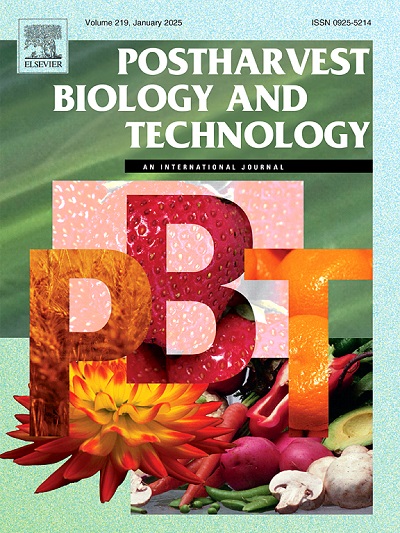2,3-丁二酮与牛至精油协同防治镰刀菌茎端腐病的作用及机理
IF 6.8
1区 农林科学
Q1 AGRONOMY
引用次数: 0
摘要
在果蔬贮藏和运输过程中,常发生由incarnatum Fusarium (F. incarnatum)引起的茎端腐病。寻找防治茎端腐病的有效方法是一项迫切需要解决的任务。本研究筛选了针对incarnatum的抗真菌药物,并采用共毒因子法对其进行联合处理,以提高杀真菌效果。结果表明,在选定的12种抗真菌剂中,2,3-丁二酮和牛至精油(OEO)对incarnatum的杀真菌效果最好。12.6 μL L−1 2,3-丁二酮与14.9 μL L−1 OEO联合使用的毒理因子为96.9,高于其他联合使用组,显示出协同效应。体外实验表明,联合处理组可以抑制F. incarnatum菌丝的生长和孢子萌发,改变菌丝形态,破坏细胞膜的完整性,最终诱导凋亡。此外,在体内实验中,联合处理组延缓了多种果蔬茎端腐病的发生,未观察到植物毒性。这些结果为肉芽孢杆菌在果蔬中引起的茎端腐病的防治提供了一种安全有效的方法。本文章由计算机程序翻译,如有差异,请以英文原文为准。
Synergistic effect and involved mechanism of 2,3-butanedione and oregano essential oil against Fusarium incarnatum caused stem-end rot
Stem-end rot of fruit and vegetable caused by Fusarium incarnatum (F. incarnatum) occurred commonly during storage and transportation. Finding effective solutions to control stem-end rot is an urgent task to be solved. In this study, antifungal agents against F. incarnatum were screened, and then the combined treatment was carried out to enhance the fungicidal effect using the co-toxicity factor method. Results showed that among the selected 12 kinds of antifungal agents, 2,3-butanedione and oregano essential oil (OEO) had the best fungicidal effect on F. incarnatum. Moreover, the co-toxicity-factor of the combined use of 12.6 μL L−1 2,3-butanedione and 14.9 μL L−1 OEO was 96.9, higher than those of other combined groups, showing a synergistic effect. In vitro experiments demonstrated that the combined treatment group could inhibit the growth of F. incarnatum mycelium and spore germination, alter mycelial morphology, disrupt the integrity of the cell membrane, and ultimately induce apoptosis. In addition, in vivo experiments, the combination treatment group delayed the onset of stem-end rot in various fruit and vegetables, with no observed phytotoxicity. These results provided a safe and efficient method for the prevention and control of stem-end rot caused by F. incarnatum in fruit and vegetables.
求助全文
通过发布文献求助,成功后即可免费获取论文全文。
去求助
来源期刊

Postharvest Biology and Technology
农林科学-农艺学
CiteScore
12.00
自引率
11.40%
发文量
309
审稿时长
38 days
期刊介绍:
The journal is devoted exclusively to the publication of original papers, review articles and frontiers articles on biological and technological postharvest research. This includes the areas of postharvest storage, treatments and underpinning mechanisms, quality evaluation, packaging, handling and distribution of fresh horticultural crops including fruit, vegetables, flowers and nuts, but excluding grains, seeds and forages.
Papers reporting novel insights from fundamental and interdisciplinary research will be particularly encouraged. These disciplines include systems biology, bioinformatics, entomology, plant physiology, plant pathology, (bio)chemistry, engineering, modelling, and technologies for nondestructive testing.
Manuscripts on fresh food crops that will be further processed after postharvest storage, or on food processes beyond refrigeration, packaging and minimal processing will not be considered.
 求助内容:
求助内容: 应助结果提醒方式:
应助结果提醒方式:


